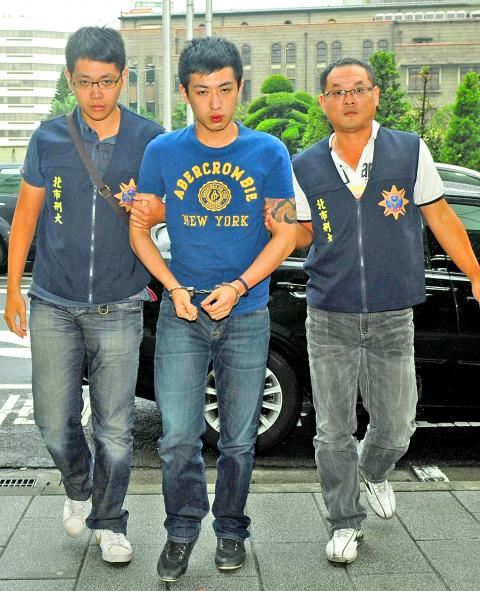One of the main suspects in the beating death of a police detective in Taipei earlier this month, Chou Yu-teng (周譽騰), turned himself in to the authorities yesterday afternoon after a manhunt by police, as the government faces pressure to investigate allegations of police corruption.
Chou was accompanied by his lawyer as he surrendered to the Taipei City Police Criminal Investigation Division office.
Hsueh Chen-kuo (薛貞國) died on Sept. 14 after being beaten up by a mob outside the ATT 4 FUN shopping mall in Taipei’s Xinyi District (信義).

Photo: Lo Pei-der, Taipei Times
The 38-year-old detective was assaulted by a group of about 50 people with sticks and knives in an ordeal that lasted at least three minutes.
He sustained multiple blows to the head and was declared dead after being rushed to hospital, police said.
Alleged to be a member of the Four Seas Gang, Chou yesterday said through his lawyer that he was not the one who shouted: “Kill him!” to fellow gang members, as reported by local media, adding that he was just an onlooker and did not take part in the incident.
Meanwhile, the Ministry of Justice announced that it would set up a special task force to investigate allegations that corruption by Taipei police had played a role in the incident, adding that the ministry’s Agency Against Corruption would handle the investigation.
Separately, the Ministry of Finance said it would start conducting strict checks of the financial accounts and tax returns of nightclubs and related entertainment businesses.
In response to allegations that corrupt police have been receiving a slice of lucrative nightclub revenues, Minister of Finance Chang Sheng-ford (張盛和) promised a government crackdown.
Chang said his ministry’s National Taxation Bureau is working with the Taipei City Government and its police units to conduct more spot checks on nightclubs and related entertainment venues, and together would also look into business accounts and check for tax evasion.
Chang made the remarks on Monday amid questions by lawmakers accusing the finance ministry of negligence, as top-line nightclubs in Taipei City reportedly make profits of several tens of millions of NT dollars each month, with little scrutiny by tax officials.
Hsueh’s family on Monday filed a suit with the Taipei District Prosecutors’ Office against Chinese Nationalist Party (KMT) Taipei City Councilor Chung Hsiao-ping (鍾小平) for insinuating that Hsueh was corrupt.
Saying he had received calls from nightclub operators saying Taipei City police colluded with triads in these profitable entertainment venues, Chung last week suggested that Hsueh was one of the corrupt officers, who allegedly acted in a “white-glove” role, collecting bribes to distribute to his police colleagues in the Taipei Xinyi District Police Precinct.
“We heard these accusations in the media, so we had to stand up to defend my husband’s reputation. Our family wants to know what happened, and we believe the truth will clear his tarnished name,” Hsueh’s wife said.
Chung said he stands by his words.
Additional reporting by CNA

Taiwan is to have nine extended holidays next year, led by a nine-day Lunar New Year break, the Cabinet announced yesterday. The nine-day Lunar New Year holiday next year matches the length of this year’s holiday, which featured six extended holidays. The increase in extended holidays is due to the Act on the Implementation of Commemorative and Festival Holidays (紀念日及節日實施條例), which was passed early last month with support from the opposition Chinese Nationalist Party (KMT) and Taiwan People’s Party. Under the new act, the day before Lunar New Year’s Eve is also a national holiday, and Labor Day would no longer be limited

COMMITMENTS: The company had a relatively low renewable ratio at 56 percent and did not have any goal to achieve 100 percent renewable energy, the report said Pegatron Corp ranked the lowest among five major final assembly suppliers in progressing toward Apple Inc’s commitment to be 100 percent carbon neutral by 2030, a Greenpeace East Asia report said yesterday. While Apple has set the goal of using 100 percent renewable energy across its entire business, supply chain and product lifecycle by 2030, carbon emissions from electronics manufacturing are rising globally due to increased energy consumption, it said. Given that carbon emissions from its supply chain accounted for more than half of its total emissions last year, Greenpeace East Asia evaluated the green transition performance of Apple’s five largest final

Taiwan is to extend its visa-waiver program for Philippine passport holders for another year, starting on Aug. 1, Minister of Foreign Affairs Lin Chia-lung (林佳龍) said on Friday. Lin made the announcement during a reception in Taipei marking the 127th anniversary of Philippine independence and the 50th anniversary of the establishment of the Manila Economic and Cultural Office (MECO) in Taiwan, the Ministry of Foreign Affairs said. The decision reflected Taiwan’s commitment to deepening exchanges with the Philippines, the statement cited Lin as saying, adding that it was a key partner under the New Southbound Policy launched in 2016. Lin also expressed hope

Temperatures in New Taipei City’s Sindian District (新店) climbed past 37°C yesterday, as the Central Weather Administration (CWA) issued heat alerts for 16 municipalities, warning the public of intense heat expected across Taiwan. The hottest location in Taiwan was in Sindian, where the mercury reached 37.5°C at about 2pm, according to CWA data. Taipei’s Shilin District (士林) recorded a temperature of 37.4°C at noon, Taitung County’s Jinfeng Township (金峰) at 12:50 pm logged a temperature of 37.4°C and Miaoli County’s Toufen Township (頭份) reached 36.7°C at 11:40am, the CWA said. The weather agency yesterday issued a yellow level information notice for Taipei, New